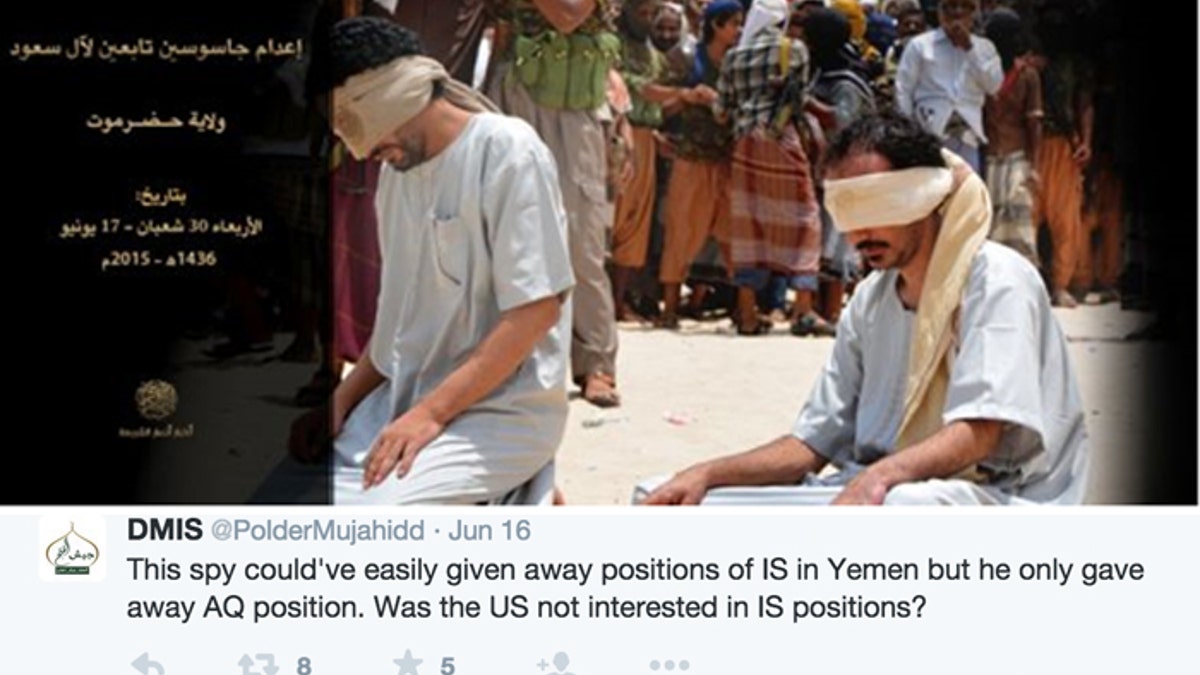
Al Qaeda supporters are pointing the finger at ISIS after CIA drone strikes have surgically targeted their operatives. (TRAC)
Key leaders of Al Qaeda in the Arabian Peninsula have been killed in recent weeks by well-timed CIA drone strikes so precise that they have stoked suspicions that rival terrorist organization ISIS is secretly leaking information to the U.S.
The paranoia spreading within AQAP was fully exposed this week when the members of that branch of Al Qaeda’s international organization publicly executed four men in Yemen who they accused of being “spies” for the U.S. and Saudi Arabia.
One man, identified as Human Al-Hamid, was hung crucifixion-style from a bridge after being accused of calling in the drone strike that killed a top AQAP leader last week. Another unnamed alleged “spy” was crucified alongside Al-Hamid, and two others were shot before a group of about 400 enthusiastic onlookers, according to a video posted Wednesday of the executions.
“The CIA’s success has left AQAP both guessing and pointing fingers at how the organization’s very careful leadership has been caught so off guard,” said Veryan Khan, editorial director of the Florida-based Terrorism Research & Analysis Consortium. “In order to complete its expansion dreams, the Islamic State either needs to win over core AQAP support or kill off its opposition letting the rest fold into its ranks. The Islamic State has the most to gain, offing of important AQAP leadership.”
“The CIA’s success has left AQAP both guessing and pointing fingers at how the organization’s very careful leadership has been caught so off guard.”
The AQAP leaders killed by CIA drone strikes, among the most dangerous terrorists in the world, have been killed off at an “alarming rate” for their fellow jihadists, Khan said. The rising body count has given rise to paranoia, say analysts. In late April AQAP-affiliated Twitter accounts openly discussed fears there are Islamic “spies” within AQAP, and hinted a group of AQAP members defected to the Islamic State and were providing intelligence to U.S. drone operations, Khan said.
On June 12, AQAP announced Nasir al-Wuhayshi, a founding member of AQAP, and direct channel for messages from top leader, Ayman al-Zawahiri, was killed three days earlier by CIA drone strikes.
“Many believed that Wuhayshi’s pedigree and trusted status made him the favorite to take over after Zawahiri’s demise,” Khan said.
Wuhayshi’s death followed the CIA’s assassination of another pedigreed, senior AQAP leader, Ibrahim Al-Rubeish, who was killed in April, spawning an outpouring of social media condolences for the man who fought in both Afghanistan and was held at Gitmo, Khan said.
Two other senior AQAP leaders based in Yemen also were killed, including Nasser bin Ali al-Ansi and Harith bin Ghazi al-Nadhari.
Nasser bin Ali al-Ansi, killed by a CIA drone May 7, appeared in many of AQAP's propaganda videos claiming responsibility for the Charlie Hebdo attack in Paris and the kidnapping of U.S. photojournalist Luke Somers.
Harith bin Ghazi al-Nadhari, killed with three other AQAP members Jan. 31 by a CIA drone strike, also had starring roles in the AQAP propaganda videos. In one, he admonished the Islamic State for its announcement that the group was expanding its caliphate into Yemen.
"The announcement of the caliphate for all Muslims by our brothers in the Islamic State did not meet the required conditions," he said. "The policy of our brothers in the Islamic State split the ranks of the mujahideen, and scattered them, in this sensitive phase in the history of the [community]. This is one of the absolutely forbidden matters in the religion of Allah."
Tension has been on the rise between AQAP and ISIS since the Islamic State has attempted to infiltrate and expand into Yemen, and by extension the Kingdom of Saudi Arabia, before the establishment of the Caliphate in 2014, and launched its official campaign into Yemen with a triple suicide mission in March 2015.
Fueling the deadly rivalry, ISIS members cheered the death of Nasir al-Wuhayshi, said Jasmine Opperman, a Cape Town, South Africa-based analyst with TRAC.
There is little ideological or moral difference between Al Qaeda and ISIS, which are both fanatical terrorist organizations with a Sunni jihadist ideology and complete disdain for life, according to Max Boot, of Commentary Magazine.
“ISIS was even once affiliated with Al Qaeda, having been previously known as Al Qaeda in Iraq," Boot wrote. "But now they are deadly rivals. Like Apple and Samsung or Adidas and Nike, Al Qaeda and ISIS are locked in a battle for market share. Those companies compete by bringing to market better products. So do terrorist organizations, only their ‘products’ are high-profile atrocities.”
Still, many are skeptical of the idea that ISIS would turn to the CIA to take out its enemy, or would even have the back channels established to do it.
“If ISIS had had information on the precise whereabouts of AQAP leaders, would it also have made sense that Islamic State would have usedthat to initiate their own attacks and thereby not only claim expansion into Yemen, but also being responsible for killing AQAP leaders?” Opperman said.
However, the fact that U.S. drone attacks could take out four AQAP leaders in Yemen in such a short time does indicate good intelligence, Opperman said. Meanwhile, the U.S. has had much less success targeting ISIS leadership, Khan said.
Whether there is justification for AQAP to believe the four men, three unnamed, executed this week by the most torturous of means were really spies for ISIS, Saudi Arabia or the CIA, may never be fully publicly vetted. But if drone strikes continue to eliminate AQAP’s leadership, the organization could continue its bloody purge, Khan said.




















